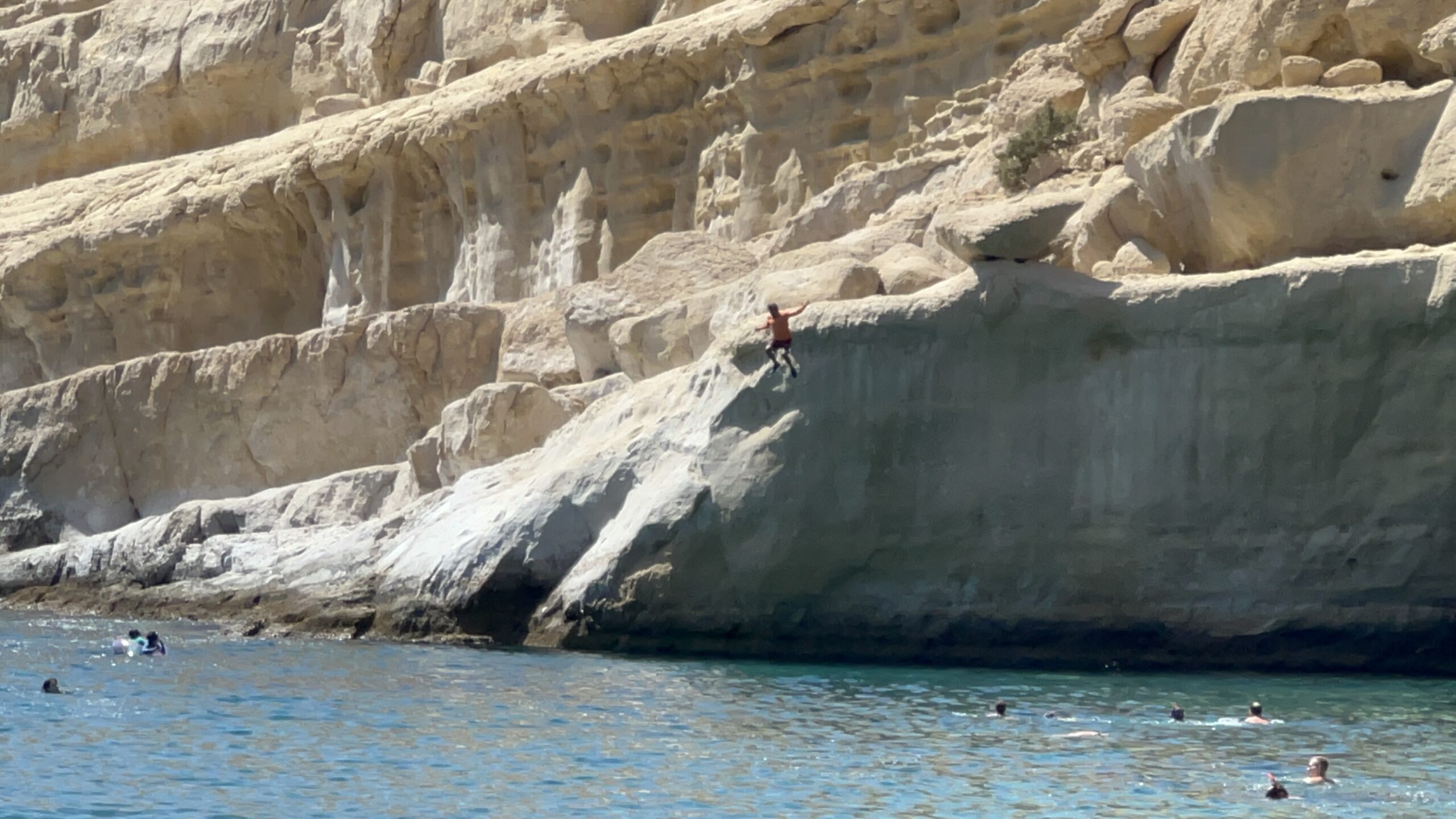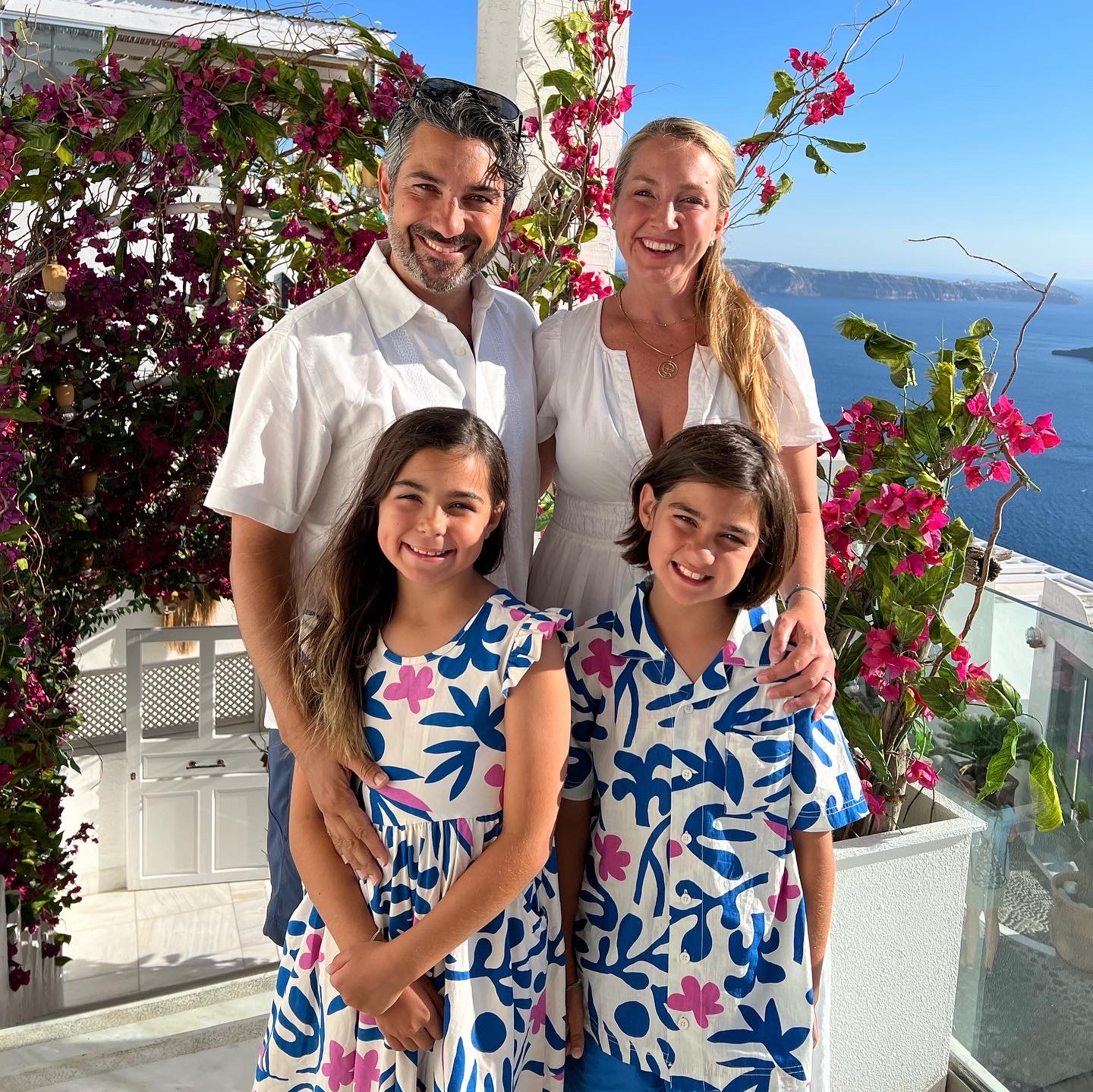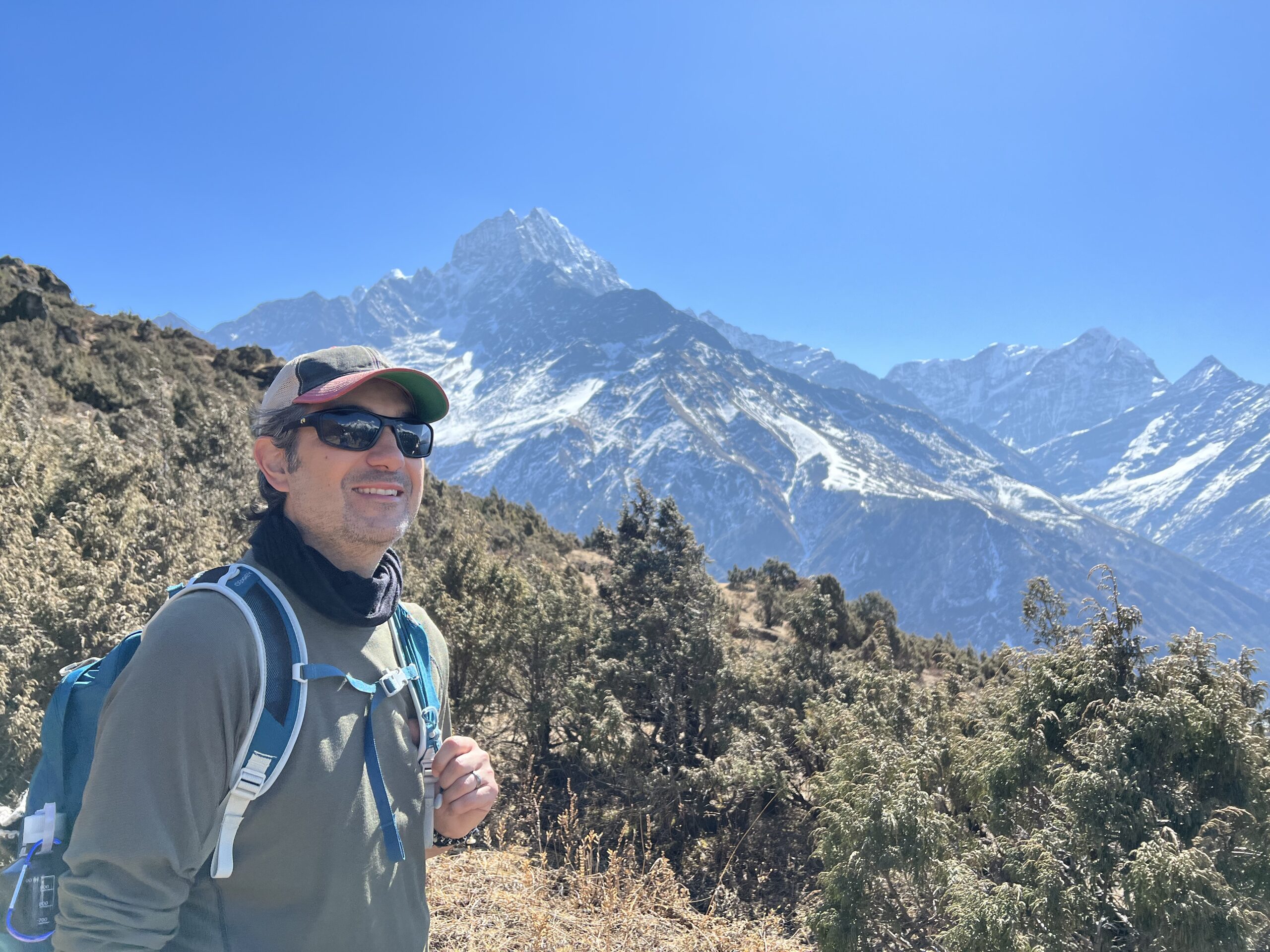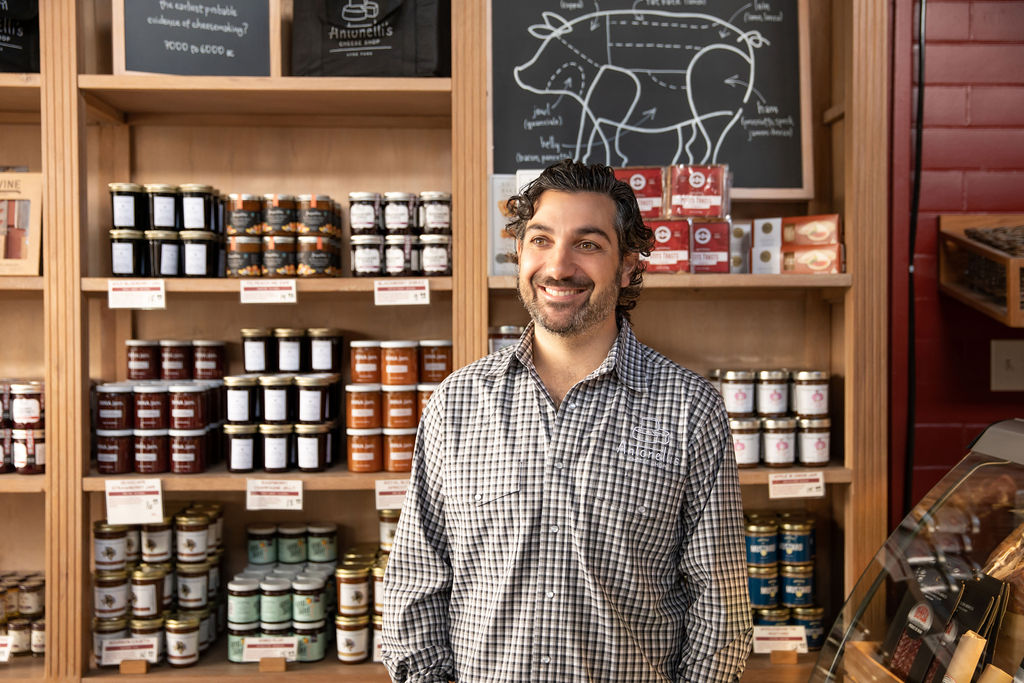When asked if/where I’d visit Greece again, I admit I left a piece of my heart in Crete. Who knows how life turns out, but I could imagine myself living there at some point. The island offers both beach relaxation and mountain hikes, as well as tourist towns and ancient ruins, all within an hours drive of each other. I’ll be back. While I hope all folks find Crete just as magical, I suspect part of my connection has to do with the following story. To get specifics on where we visited, check out our Greece Travel Log. You can read more about Greek Cheese on Kendall’s blog.
***
 I started planning our family trip to Greece in 2019; I knew then that I was interested in visiting Crete. In fact, my infatuation with the Aegean Sea island started in 2018 just before I turned 36. At the time, I was in the best shape of my life (post high school cross country). Following a broken ankle in 2016 (thank you last step of the two story maze at Puzzle World in Wanaka, New Zealand) I had committed to getting healthy. I was eating well, working out multiple times a week, and taking care of myself with morning gratitudes, affirmations, and journaling. This was a great two years leading up to opening our second location in the Fareground.
I started planning our family trip to Greece in 2019; I knew then that I was interested in visiting Crete. In fact, my infatuation with the Aegean Sea island started in 2018 just before I turned 36. At the time, I was in the best shape of my life (post high school cross country). Following a broken ankle in 2016 (thank you last step of the two story maze at Puzzle World in Wanaka, New Zealand) I had committed to getting healthy. I was eating well, working out multiple times a week, and taking care of myself with morning gratitudes, affirmations, and journaling. This was a great two years leading up to opening our second location in the Fareground.
In April 2019, when I experienced a shoulder injury during a workout, instead of being dejected, I put my energy towards a lifelong goal of mine: to run a marathon. I decided that I would do this before my birthday, thus giving my shoulder time to heal and keeping me in shape. I signed up for a trail marathon in Pedernales State Park 30 days later and instead of doing easy runs on the weekends, I signed up for three half marathons instead: a trail half at Pace Bend Park, a road half on the Randolph Airforce Base, and a trail half in Bastrop State Park (recently affected by forest fires). (Note: I don’t recommend poor training and rash decisions.) Instead of listening to music during the training runs and half marathons, I chose to listen to motivational books on tape. Things that would keep me going with the miles ran longer than my mind was ready for. One of those books was Natural Born Heroes by Christopher McDougall. I remember starting this book the morning of the Bastrop Half Marathon. It is a book that talks about remarkable athletic prowess focused around the normal men and women of Crete during WWII. (This link is a great book review and will get you amped up to read it, if you haven’t already.)
 The book sheds light on the amazing stamina, humanity and fortitude that the Cretan shepherds had to ensure that Crete was never fully occupied by the Germans. It sheds light on the hospitality of the region and their ability to overcome so many injustices and hardships to save themselves. One of the characters that is spoken of frequently is George Psychoundokis. He was a runner for the British spies (very few) who had taken the responsibility of trying to subvert the German Army in any way possible, including sending messages abroad via long transmission radios. As a runner, George would have to take messages from one town to another, or one mountain range to another as quickly as possible. From the book alone it’s impossible to understand how much effort it must have taken until you arrive on Crete and see how rocky, scraggly, and mountainous it is. I was in awe from the moment I took in the scenery and inspired to learn more.
The book sheds light on the amazing stamina, humanity and fortitude that the Cretan shepherds had to ensure that Crete was never fully occupied by the Germans. It sheds light on the hospitality of the region and their ability to overcome so many injustices and hardships to save themselves. One of the characters that is spoken of frequently is George Psychoundokis. He was a runner for the British spies (very few) who had taken the responsibility of trying to subvert the German Army in any way possible, including sending messages abroad via long transmission radios. As a runner, George would have to take messages from one town to another, or one mountain range to another as quickly as possible. From the book alone it’s impossible to understand how much effort it must have taken until you arrive on Crete and see how rocky, scraggly, and mountainous it is. I was in awe from the moment I took in the scenery and inspired to learn more.
 During the war, George took notes and kept journals of things he was asked to do, or places he was asked to go. And after the war, one of the British soldiers he had helped heard about these notes and turned them into a book The Cretan Runner. So on my first day in Crete, I downloaded a copy and spent the next few days reading every description and every note. Many times I tried following his path on google maps. However, only sheep or goats would still be able to find the many caves, matatas (cheese huts), and routes that they spent months in throughout the mountains. Like most of us, George wasn’t born thinking he was a hero. But like all of us, he was capable of being a hero and when the moment came he stepped up.
During the war, George took notes and kept journals of things he was asked to do, or places he was asked to go. And after the war, one of the British soldiers he had helped heard about these notes and turned them into a book The Cretan Runner. So on my first day in Crete, I downloaded a copy and spent the next few days reading every description and every note. Many times I tried following his path on google maps. However, only sheep or goats would still be able to find the many caves, matatas (cheese huts), and routes that they spent months in throughout the mountains. Like most of us, George wasn’t born thinking he was a hero. But like all of us, he was capable of being a hero and when the moment came he stepped up.
 In many ways, visiting Greece was a turning point in my life. Two weeks after I finished my marathon, Kendall had back surgery and was bed ridden for three months. After that, our spinoff concept at the Fareground failed and needed to be closed. Subsequently, I spent much of the last few years working through a mental health crisis. Spending time in Crete and reading about the personal heroics of George and his covert colleagues reminded me of the strength I have in myself. Reading about how he and his friends found joy sitting in cold wet caves during the winter months reminded me that it’s not always easy to find joy but it’s there if you’re willing to look. I truly fell in love with the history, hospitality, and culture of Crete. I cannot wait to go back and spend some more time searching for unmarked trails, unmarked caves, each with inspired stories that we’ll probably never know and can only wonder at…but that will no doubt impact me to find my own brand of heroism.
In many ways, visiting Greece was a turning point in my life. Two weeks after I finished my marathon, Kendall had back surgery and was bed ridden for three months. After that, our spinoff concept at the Fareground failed and needed to be closed. Subsequently, I spent much of the last few years working through a mental health crisis. Spending time in Crete and reading about the personal heroics of George and his covert colleagues reminded me of the strength I have in myself. Reading about how he and his friends found joy sitting in cold wet caves during the winter months reminded me that it’s not always easy to find joy but it’s there if you’re willing to look. I truly fell in love with the history, hospitality, and culture of Crete. I cannot wait to go back and spend some more time searching for unmarked trails, unmarked caves, each with inspired stories that we’ll probably never know and can only wonder at…but that will no doubt impact me to find my own brand of heroism.
 Here are some great quotes from Natural Born Heroes. Whether or not you like running, I hope it inspires you to pick up a book. Better yet, I hope it gets you to Crete, and you feel just as connected to that magical land as I did.
Here are some great quotes from Natural Born Heroes. Whether or not you like running, I hope it inspires you to pick up a book. Better yet, I hope it gets you to Crete, and you feel just as connected to that magical land as I did.
- “Solvitur ambulando: “When in doubt, walk.”
- “Because that’s the ugly truth about heroism: the tests don’t start when you’re ready or stop when you’re tired.”
- “True heroism, as the ancients understood, isn’t about strength, or boldness, or even courage. It’s about compassion.”
- “On Crete, a grown-up is known as a dromeus, or ‘runner.’ To be considered a full Cretan, you had to be strong enough and resourceful enough to run to someone’s aid. Until then, young Cretans are just apodromos – ‘not quite a runner.’”
- “Empathy, the Greeks believed, was a source of strength, not softness; the more you recognized yourself in others and connected with their distress, the more endurance, wisdom, cunning, and determination you could tap into.”
- “The ancient Greeks loved that little interlocking contradiction, the idea that you’re only your strongest when you have a weakness for other people.”
Related Posts



